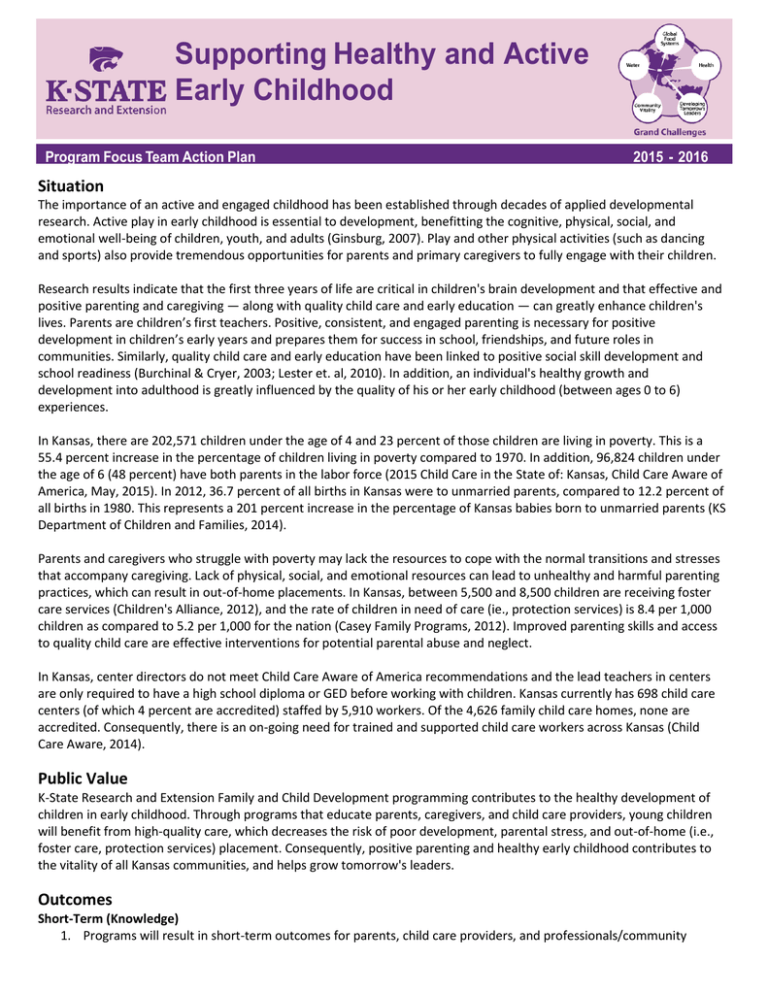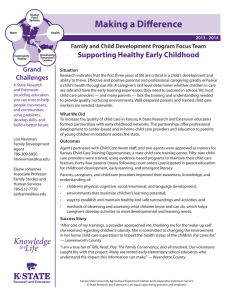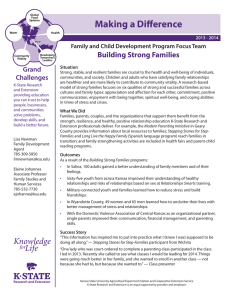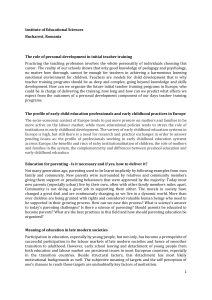Supporting Healthy and Active Early Childhood
advertisement

Supporting Healthy and Active Early Childhood Program Focus Team Action Plan 2015 - 2016 Situation The importance of an active and engaged childhood has been established through decades of applied developmental research. Active play in early childhood is essential to development, benefitting the cognitive, physical, social, and emotional well-being of children, youth, and adults (Ginsburg, 2007). Play and other physical activities (such as dancing and sports) also provide tremendous opportunities for parents and primary caregivers to fully engage with their children. Research results indicate that the first three years of life are critical in children's brain development and that effective and positive parenting and caregiving — along with quality child care and early education — can greatly enhance children's lives. Parents are children’s first teachers. Positive, consistent, and engaged parenting is necessary for positive development in children’s early years and prepares them for success in school, friendships, and future roles in communities. Similarly, quality child care and early education have been linked to positive social skill development and school readiness (Burchinal & Cryer, 2003; Lester et. al, 2010). In addition, an individual's healthy growth and development into adulthood is greatly influenced by the quality of his or her early childhood (between ages 0 to 6) experiences. In Kansas, there are 202,571 children under the age of 4 and 23 percent of those children are living in poverty. This is a 55.4 percent increase in the percentage of children living in poverty compared to 1970. In addition, 96,824 children under the age of 6 (48 percent) have both parents in the labor force (2015 Child Care in the State of: Kansas, Child Care Aware of America, May, 2015). In 2012, 36.7 percent of all births in Kansas were to unmarried parents, compared to 12.2 percent of all births in 1980. This represents a 201 percent increase in the percentage of Kansas babies born to unmarried parents (KS Department of Children and Families, 2014). Parents and caregivers who struggle with poverty may lack the resources to cope with the normal transitions and stresses that accompany caregiving. Lack of physical, social, and emotional resources can lead to unhealthy and harmful parenting practices, which can result in out-of-home placements. In Kansas, between 5,500 and 8,500 children are receiving foster care services (Children's Alliance, 2012), and the rate of children in need of care (ie., protection services) is 8.4 per 1,000 children as compared to 5.2 per 1,000 for the nation (Casey Family Programs, 2012). Improved parenting skills and access to quality child care are effective interventions for potential parental abuse and neglect. In Kansas, center directors do not meet Child Care Aware of America recommendations and the lead teachers in centers are only required to have a high school diploma or GED before working with children. Kansas currently has 698 child care centers (of which 4 percent are accredited) staffed by 5,910 workers. Of the 4,626 family child care homes, none are accredited. Consequently, there is an on-going need for trained and supported child care workers across Kansas (Child Care Aware, 2014). Public Value K-State Research and Extension Family and Child Development programming contributes to the healthy development of children in early childhood. Through programs that educate parents, caregivers, and child care providers, young children will benefit from high-quality care, which decreases the risk of poor development, parental stress, and out-of-home (i.e., foster care, protection services) placement. Consequently, positive parenting and healthy early childhood contributes to the vitality of all Kansas communities, and helps grow tomorrow's leaders. Outcomes Short-Term (Knowledge) 1. Programs will result in short-term outcomes for parents, child care providers, and professionals/community members. 2. Parents/caregivers will understand the importance of: - positive parent-child interaction (e.g. support, caring, enjoyment, decrease in hitting and neglect). - clear and consistent communication (e.g. clear/age-appropriate directions, positive messages, decreased adult harshness, bullying, and verbal abuse). - adaptable and flexible parent practices (e.g. giving age-appropriate choices, age appropriate expectations, decreased stress and anger with parenting). - emergent literacy skills and the link with adult-child interactions. - quality early child care environments and how to properly evaluate them. 3. Parents/caregivers, child care providers, and early care and education professionals/community members will also improve their awareness, knowledge, and understanding of: - active physical, cognitive, social/emotional, and communication development of children. - the role of active learning environments that meet children's needs, capabilities, and interests to maximize their learning potential. - the role of healthy activities and environments in early childhood and how to establish and maintain them. - the importance of observing and assessing what children know and can do, which will help adults develop activities that meets the children's developmental and learning needs. - establishing and maintaining an environment that ensures children's health, safety, and development. - how important it is to establish supportive, active relationships with the children in their care, and to guide them as individuals, and as part of a group. Indicators 1. Parents/caregivers will agree that they have increased awareness, knowledge, and understanding of: - Positive parent-child interaction (e.g. support, caring, enjoyment, decrease in hitting and neglect). - Clear and consistent communication (e.g. clear/age-appropriate directions, positive messages, decreased adult harshness, bullying, and verbal abuse). - Adaptable/flexible parenting practices (e.g. giving age-appropriate choices, age appropriate expectations, decreased stress and anger with parenting). - Emergent literacy and practices to engage with children around reading. - Quality early childhood education facilities and how to evaluate them. 2. Parents, child care providers, and early care and education professionals/community member program participants also agree that they have increased awareness, knowledge, and understanding of: - development of children in their early years (ages 0-6). - the role of the learning environment in early childhood education and how to establish and maintain. - the role of healthy activities and environments in early childhood how to establish and maintain them. - the role of observation and assessment in early childhood education. - the role of supportive relationships in early childhood education. Medium-Term (Behavior) Programs will result in medium-term outcomes for parents, child care providers, and professionals/community members. 1. Parents/caregivers will practice: positive parent-child interaction (e.g. support caring, enjoyment, decrease in hitting and neglect clear and consistent communication (e.g. clear/age-appropriate directions, positive messages, decreased adult harshness, bullying, and verbal abuse). adaptable-flexible parenting practices (e.g. giving age-appropriate choices, age-appropriate expectations, decreased stress and anger with parenting). emergent literacy practices (e.g., asking questions, offering instruction, thinking about the child's thinking). careful early childhood development environments (e.g. child care/early childhood education facilities). 2. Parents, child careproviders,andearlycareandeducationprofessionals/communitymembers also will: apply information on the benefits of an active and engaged childhood on physical, cognitive, social/emotional, and communication development of children, and learning patterns of individuals and groups to their work with children in their care. - plan, implement, and evaluate programs that improve active learning environments to maximize children's learning potential and meet their needs, capabilities, and interests. plan, implement, and evaluate programs that encourage healthy activities, eating, and social-emotional development. support observations and assessments that inform the development of activities that meet children's developmental and learning needs. establish and maintain healthy, nourishing, active, and safe environments for children in early childhood. establish supportive relationships with children in their care, and guide them as individuals, and as part of a group. Indicators Parents, child care providers, and early care and education professionals/community member program participants will: apply what they have learned about the development of children in their early years (ages 0 to 6). improve and maintain learning environments in early childhood learning and education. improve and maintain healthy activities and environments for healthy early childhood. use observation and assessment to develop effective activities for early childhood education. support positive, caring relationships for early childhood learning and education. Long-Term (Change in Condition) 1. In Kansas, during their early years (0 to 6), children will have healthy and active development in settings where parents, caregivers, and child care providers have the skills necessary to support, enhance, and sustain that development. 2. Children and their families will also have access to child care centers and family child care homes staffed by well-trained, informed, and effective child care workers. Indicators After the programs have been completed, parents/caregivers report being more confident and able of their positive parenting practices, and care-givers and child care workers are better trained and equipped to support the positive growth and development of children in early childhood. Outputs Program Participants - parents and caregivers of young children - family child care home providers - child care center directors and staff - community leaders - Extension field faculty Programs (Evidence-based programs) I am Moving, I am Learning: national Head Start curriculum to promote structured environments for movement and healthy eating. (DoD/USDA CYTTAP provides training at scheduled times during the year.) Rock Solid Foundations: University of Nebraska social emotional curriculum derived from Vanderbilt University's CSEFEL program. (DoD/USDA CYTTAP provides training at scheduled times during the year.) Employee ServSafe: KSRE program delivers consistent food safety training suitable to providers involved with the preparation and serving of food. Better Kid Care by Pennsylvania State University : Online modules and face-to-face training provided by extension agents and local child care networks. Programs (Evidence-informed, minimal participant commitment, such as 1hr/1 session programs) The Best Care by the University of Arkansas: Multi-module curriculum covering topics from allergies, fruits, and vegetables to child behavior and early money literacy. (Available on the FSHS Extension website in the Early Childhood section.) Understanding Challenging Behavior and Building Positive Relationships by Rebecca McFarland: Includes teaching guide, Powerpoint presentation, and additional resources. Managing Challenging Behavior by Creating Supportive Environments by Rebecca McFarland: Includes teaching guide, Powerpoint presentation. Resources Basic Parenting by Dr. Chuck Smith: Comprehensive parent education program that focuses on 80 principles and skills that form the foundation for effective parenting. Web-based multi-module course available at: www.ksu.edu/wwparent/programs/basic/ (Wonder Wise Parent) Responsive Discipline: a decision-making approach to guidance in parent-child relationships by Dr. Chuck Smith: Web-based, multi-module course available at: www.ksu.edu/wwparent/courses/rd/ (Wonder Wise Parent) Great Beginnings for Families by Iowa State University: Contains six lessons and support materials. Center on the Developing Child at Harvard University: developingchild.harvard.edu/ Kansas Child Care Training Opportunities (KCCTO): http://kccto.org Child Care Aware of Kansas: www.ks.childcareaware.org/ Kansas Online Facility Compliance Search: http://kdheks.gov/bcclr/capp.htm KSRE Publications by Dr. Bradford Wiles (2014-2016): Choosing Care for Your Children: Child Care Homes (Fact Sheet); http://www.ksre.ksu.edu/bookstore/pubs/MF3175.pdf Choosing Care for Your Children: Child Care Centers and Preschools (Fact Sheet); http://www.ksre.ksu.edu/bookstore/pubs/MF3176.pdf Disasters: Children's Responses and Helping Them Recover (Fact Sheet); http://www.ksre.ksu.edu/bookstore/pubs/MF3196.pdf Desastres: Las Respuestas de los Niños y Ayudándoles a Recuperarse (Disasters: Childrens' Responses and Helping Them Recover) (Fact Sheet); http://www.ksre.ksu.edu/bookstore/pubs/MF3196S.pdf Emergent Literacy: Helping Young Children’s Development Through Reading (Leader’s Guide); www.ksre.ksu.edu/bookstore/pubs/MF3162.pdf Emergent Literacy: Helping Young Children’s Development Through Reading (Fact Sheet); www.ksre.ksu.edu/bookstore/pubs/MF3161.pdf Talk-Read-Play with your Child Every Day (Fact Sheet); www.ksre.ksu.edu/bookstore/pubs/MF3113.pdf Spanish version of Talk-Read-Play with your Child Every Day (Fact Sheet); www.ksre.ksu.edu/bookstore/pubs/MF3113S.pdf Kansas State University Agricultural Experiment Station and Cooperative Extension Service. K-State Research and Extension is an equal opportunity provider and employer




